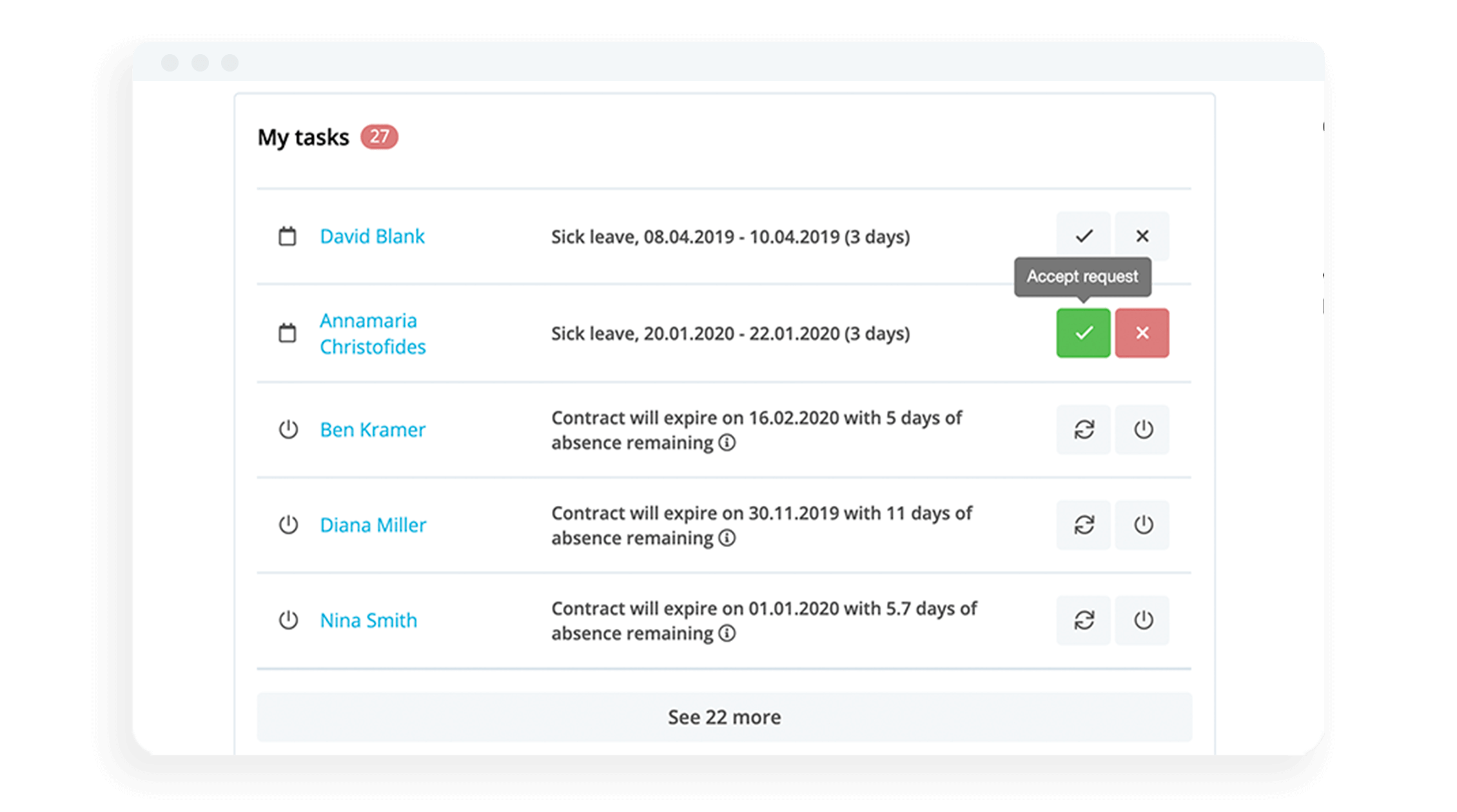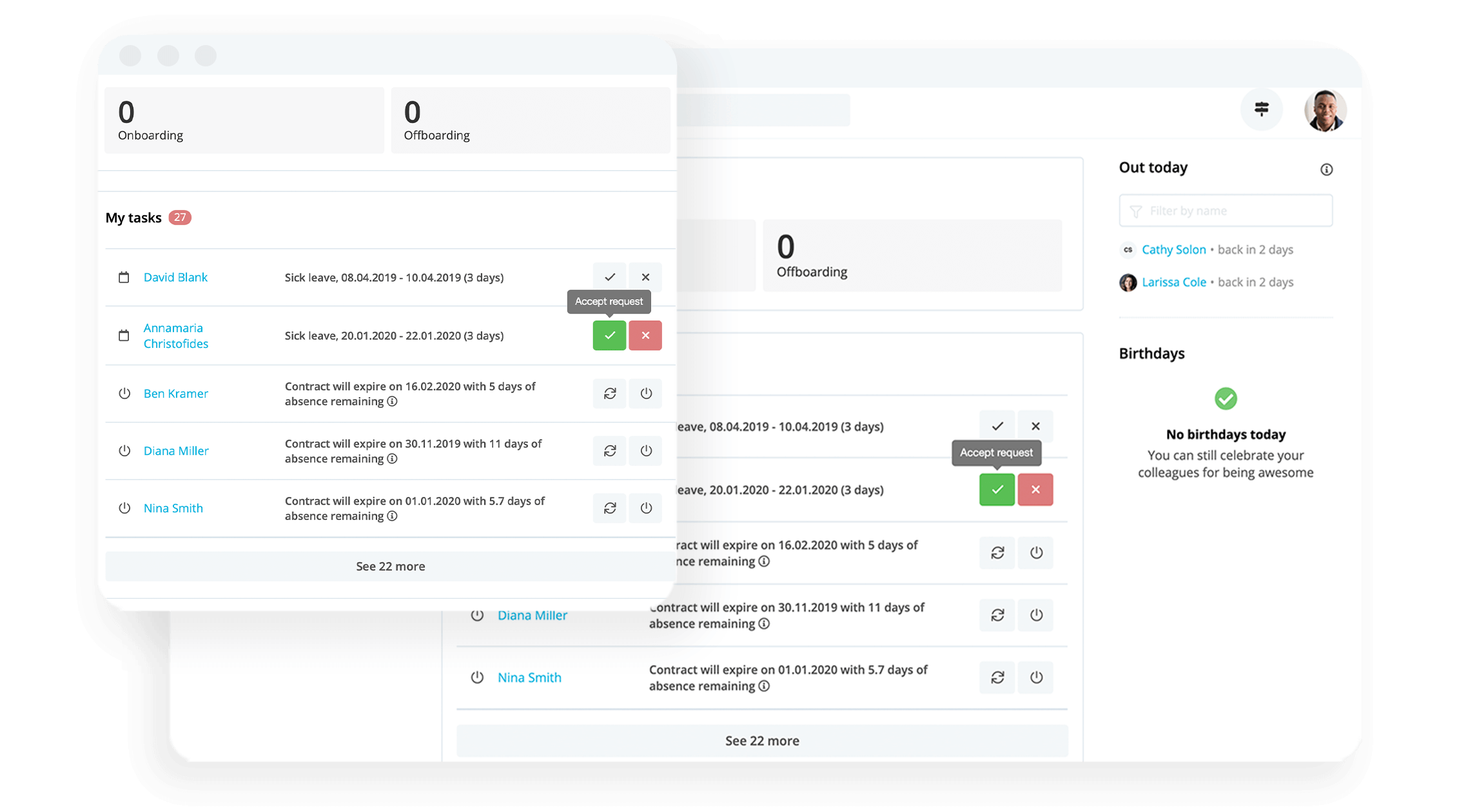
Keep Everyone Organised
Stay on top of all HR tasks and complete them on time, every time.
Create reports in seconds16. June 2020
HR’s Daily Dilemma: Between Management and Staff

HR should operate on equal footing with both management and employees. This means arguing cases based on figures and supporting business objectives on the one hand, and developing and looking after employees on the other. Meanwhile, HR also deals with a lot of administrative work, such as managing absences and salaries, and at the same time performs strategic tasks like finding solutions for the current shortage of IT specialists. People in HR need to be deeply familiar with all of these requirements if they are to fulfill their role. Only by setting boundaries are they able to focus on core issues. This article describes challenges to successful HR management, and how to operate effectively at the interface between both of the worlds above.
What Employees Expect From HR
Employees expect a sympathetic ear, especially for personal workplace issues. An example would be, ‘I don't feel that my boss is taking me seriously’. In this case, HR could ask whether the employee wants any action to be taken, or whether they simply want to be heard. If HR managers take up any issues with management, they should always inform the respective employee beforehand.
Often, HR is the only place where employees feel free to say what bothers or burdens them. It is also the place where they can discuss confidential matters. As a result, HR managers accumulate powerful knowledge, which they should be careful not to exploit.
HR looks after people. That is the expectation people have, and HR managers need to meet this responsibility. An example: After a department head resigns unexpectedly, an HR team member gets a few people from the department together to have a chat about the resignation. This could be over a shared lunch, at the office or even after work.
What Management Expects From HR
Management expects that HR keeps things running smoothly. This includes hiring enough people, hiring the right people, creating an environment where people feel good and are able to thrive, and quite a bit more. People in HR should have a thorough understanding of the company’s business, including its challenges, and adapt HR objectives to business objectives. So far, so good.
Management wants to hear about problems as soon as they occur. ‘I have the feeling that people in department x aren’t as satisfied as they should be’, is not something that will be well received, though. HR managers should instead have evidence in the form of hard figures, and provide reasons. For example: ‘We’ve recently seen more and more employees in department x reporting sick for a few days at a time. This often happens after projects have been completed, and it therefore looks like employees are overworked.’ That is something management can work with, and ideally this would kick off a dialogue.
HR often acts as a company’s empathy department, with people in HR reflecting on matters senior management does not have the time to engage with. Executives appreciate this, but expect that HR will not raise every minor issue or place too much emphasis on soft factors. After all, it is facts and figures that will interest management most.
HR is meant to be a partner in business, it is often said. Simply put, this means that HR should be familiar with the company’s business objectives and challenges, and plan and develop staff levels and employees accordingly. If HR needs resources to do this, they should support their need with sound figures. For example: ‘Current hiring goals are based on the company’s business objectives. If we conduct x interviews per position, on average, I’ll need y recruiters to meet these goals. I don’t have that many at the moment and will therefore need z new colleagues.’
What Team Leaders (Supervisors / Managers) Expect
Since managers do not often share the empathic approach shown by people in HR, it is usually up to HR to raise awareness of developing problems. This means that they need to describe incidents objectively and ask the manager openly for their view of the situation. This is no place for blame or accusations. It is rather about understanding the problem and jointly finding a solution, which may involve seeking out a talk with selected colleagues.
An example: A manager decides to shift the regular team meeting from Friday mornings to Friday afternoons. This upsets the team, because some would like to work from home or leave earlier on Fridays. But they share their criticism with HR, rather than the manager concerned. It is therefore up to HR to assess whether the manager needs to know and possibly respond. If the matter concerns a recurring issue (‘this sort of decision is always made top-down’), HR could suggest that the manager discuss it with the team. While the HR department is not a leadership coach, it needs to establish a framework and provide options. Senior managers then ‘merely’ need to take up these options.
What Management Underestimates
The higher you go in a hierarchy, the more it is about numbers. Senior management believes that good work is reflected by good numbers. However, executives often fail to appreciate that empathy is work, too. While it cannot be measured, it is relevant, including for business. If, for example, a high-performing employee intends to resign, but HR convinces them to stay, the company saves an annual salary in opportunity costs as a result. This is how much it costs to fill a vacancy, on average.
Another point that is often overlooked: When an HR manager discusses HR-related issues with an employee over lunch, this can be hard – and important – work. Employees need to feel that they are being taken seriously and valued on a personal level if they are to feel good, come to work happily and make a contribution.
Ensure Nothing Gets Forgotten About

Automatically assign tasks to colleagues and track which to-dos are still outstanding. Get reminders of tasks that are due and important dates like probations, work anniversaries and birthdays.
Manage HR Tasks With PersonioFinally, management occasionally underestimates just how valuable the expertise accumulated in HR is. HR usually has a keen sense for developments among employees, because it receives first-hand information early on or has a finely-honed perception. HR knows when things run smoothly, when there are a few bumps along the way or alarm bells need to be sounded – and responds accordingly. An example: Members of various teams provide feedback that there is quite a bit of frustration evident during weekly team meetings. In response, HR launches a regular Friday survey asking employees about what they think is going well or not so well, and what employees would like to see. Based on the survey results, specific initiatives can then be created to improve both team spirit and performance.HR is a good seismograph. Any company that wants to develop and grow needs to work closely with HR, although many executives prefer to involve external consultants rather than explore different perspectives internally.
Which Side Are You On?
HR is right in the middle between senior management and employees and represents both groups’ interests equally. This demands a lot of sensitivity and impartiality. In certain situations, HR can also take sides, though. Let us look at the calculation of leave as an example. There are managers who do not like employees taking off half days. At the same time, there are many employees who simply need an afternoon off, whether to travel to spend time with a partner living in another city, whether to help relatives with their shopping, etc. Using the right arguments – work-life balance is a promise that the company makes, but does not necessarily keep, etc. – HR will be able to convince management that this sort of flexibility is essential. In the short term, it will benefit all employees, and in the long-term it will also have positive outcomes for management, if they see that flexibility works and employees remain motivated, among others to stay with the company.
Trust is essential in all this. HR must act in a manner that ensures it enjoys the trust of both employees and management and never plays one side off against the other. HR should not be partial, but can definitely represent interests. HR managers’ core tasks involve openness and understanding in both searching for and offering solutions.For example: An employee complains loudly about a management decision. Their HR manager could complain together with them, just to buddy up. But that is precisely what they should avoid. Instead, they should always try to foster an understanding of the other side and lower the emotional temperature. This is the only way to arrive at a solution.
The same applies in the converse case: A manager drops by in HR and complains vocally about an employee. Again, HR should try to build common ground and place things into context. Often, people simply want to let off steam. In this case, HR needs to dial back emotions and suggest a meeting with the employee. Most importantly, knee-jerk reactions must be avoided. In this case, HR takes a mediating role – a bit like a kindergarten teacher, always sticking to neutral ground.
Occasionally, HR also needs to pass on bad news from management to employees. As long as the relevant management decision is supported by HR, this is again about eliminating emotional reactions as far as possible and addressing the issue objectively instead. HR should suggest that managers discuss difficult decisions with employees and make themselves available for questions.
The environment employees need is not necessarily the environment preferred by senior management. Employees want a good work-life balance, meaningful work, a positive atmosphere, etc., while senior management wants business to flourish, above all. HR cannot resolve this conflict, but it can mediate between these two worlds and translate their separate interests. HR should communicate to management just how difficult and challenging this task can be.
How Much Leeway Do You Have?
As a rule, managers’ tasks include two aspects: an implementing and a strategic, creative function. The higher you go in a hierarchy (senior management), the more it is about strategic aspects. Depending on the level at which you work in HR, you will be more concerned with implementation or creative tasks. In both cases, it is important that you maintain a clearly structured dialogue with your company’s managers and executives to strengthen your ongoing cooperation. The relevant framework, within which you address and assert your interests, needs to be established by senior management, though.
Case Study I: An Employee Requests Confidentiality From HR
‘My supervisor doesn’t treat me fairly’. What to do if HR receives this sort of criticism, together with a request not to share it with anybody. If the matter is relevant for the team’s or company’s overall performance, or involves a breach of core principles such as respectful conduct, HR should respond. HR managers should seek to discuss the matter with the supervisor concerned, without naming names, in order to get to the bottom of it and work towards a solution.
People in HR are a little like doctors or lawyers in that they are essentially under an obligation to maintain confidentiality. If a colleague ‘only’ needs to let off steam on an issue that does not affect others, the matter may rest safely within the HR department. Conversely, people working in HR must also be able to rely on their department providing a space where they can safely raise sensitive or stressful matters without worrying that they might be shared with somebody outside HR. This is important, because HR often involves emotional matters.
Case Study II: An Employee Needs Extra Time Off
HR is often the first, or only, department to hear about stressful events in employees’ private lives. These can include things such as separations from a partner, needing to provide care for loved ones, or severe illness. As a result, employees may ask for time off, because they would not cope otherwise, emotionally or physically. In this case, the challenge for HR lies in sensitively asking management for flexibility – at least for a limited period of time. Managers will look at the loss of performance rather than personal hardship, and they are quite right to do so, as that is their job. HR, in contrast, can foreground precisely the personal aspects at issue and explain to management that they are dealing with a one-off, temporary situation and that things will be fine. Otherwise, the consequences may be more severe.
An example: An employee is overworked and asks to be relieved from day-to-day tasks for a few weeks, meaning that they will not be able to add any value for this period. Depending on where they work, this may be difficult. But it would be even more damaging if the employee fell ill for several months because the company failed to respond early on. In some ways, the challenge is therefore to balance personal and business interests, which should be harmonized in the long run.
Where Can HR Set Boundaries?
Boundaries are quite personal, and everybody needs to define their own. However, the following rules should apply to everybody working in HR: In the HR department, you can talk about anything. Everything that is said in HR, stays in HR. If an employee wishes to raise a concern or problem, it is not your task as an HR employee to solve it. You need to get management to solve it instead. You do not need to look after each and every (private) concern raised by your colleagues. If an employee comes back to HR again and again to communicate their general dissatisfaction, you are very much within your rights to tell them quite clearly to do something about it.What Your Job is AboutThe best part about working in HR is definitely the close contact with employees. Even if it is challenging work – HR is essential, and that is a powerful motivator. What is difficult or even demotivating about working in HR is that HR is often expected to come to the rescue long after the baby has been thrown out with the bath water. HR managers will often ask why they are not included in communications. This is because personal (and personnel) matters are often underestimated, which is both disappointing and dangerous, because it can in fact hurt business. The more vehemently HR states its interests, from a basis of sound evidence, the more quickly awareness of HR matters will improve.
With Personio, HR is no longer the complaints department.
Personio frees up time previously used (or wasted) on routine tasks.
Personio makes your HR work:
faster (automated workflows)
better (error-free workflows)
measurable (reports at the click of a button)
more cost-effective (for example by consolidating tools)
more transparent (Employee Self Service)
accessible around the clock (mobile access)
GDPR-compliant
strategic
Book Your Free Demo

About Laura Schroeder
Laura Schroeder is a brand and innovation strategist who has worked and advised in the HR technology space for 15 years at leading global organizations. As Head of Brand and Comms at Personio, her focus is helping HR teams scale operations, reduce complexity and work more strategically.